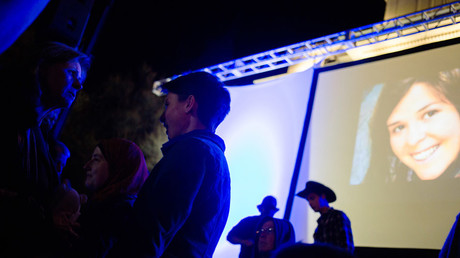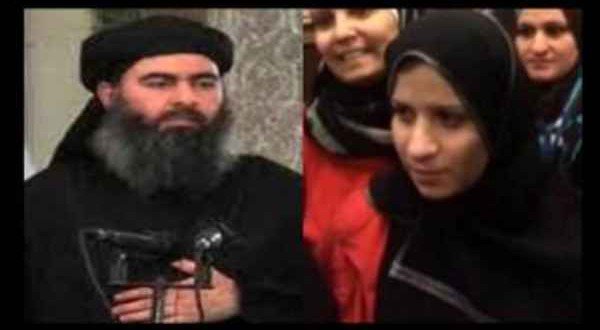
A single mother of four, the escaped wife of the supreme commander of Islamic State has shared her story, claiming her husband was “a normal family man. How he could become Emir of the most dangerous terrorist organization in the world is a mystery.”
The world exclusive interview with Sweden’s Expressen comes after years of shunning all contact with the media. Saja al-Dulaimi spoke to the reporter from a secret location somewhere on the Syrian-Lebanese border, where she ended up after several stints in detention, along with her four children.
Al-Dulaimi told Expressen Abu Bakr Al-Baghdadi was a far cry from the image of the world’s most feared terrorist. And that while their marriage was not full of tenderness, her husband loved her children as his own and was a hero to them.
Coming from an upper-class family - her father having served in Saddam Hussein’s guard - Al-Baghdadi came into al-Dulaimi’s life by way of an arranged marriage, after she was widowed and left with three children by a husband who died fighting the Americans at a time when many Iraqis were taking up arms.
Interestingly, Al-Baghdadi – then known only as Hisham Mohammad – was not among those who took part. He was a rather quiet academic who spent most of his time at the university, where he taught religion and Sharia.
Life was tough for al-Dulaimi. She had to share her new home with Al-Bahgdadi’s former wife, who was visibly unhappy with the situation – not least because he had allegedly failed to inform her that a new woman was moving in, and with children. There is speculation that Al-Baghdadi wanted to abide by Islamic tradition and provide for his new wife’s children as he would for his own. In Islam, this increases one’s chances of attaining favor after death.
The Islamic State (IS, formerly ISIS) leader was “an enigmatic person,” Saja says. "He didn't say much about his background. He was mysterious. He wasn't very talkative. We met in the evenings, over dinner.”
Asked if she ever loved him, she said “No, I was not in love with him, I didn’t love him.” She described the relationship in the household to basically amounting to him issuing orders for her to do or fetch something, rarely anything more intimate.
There were times he would disappear for days. He would never say where he’d been.
The whole situation began to seem rather uncomfortable after only several months of sharing a household with Al-Baghdadi’s former wife. Al-Dulaimi doesn’t shy away from saying she eventually had to flee from Al-Baghdadi.
"I had been pregnant for a month without either of us knowing. I left him. Yes, you could say that I fled from him,” she says.“It had nothing to do with him as a person. I wasn't happy. It was unfair on his first wife. She was very upset. That's why I left."

She preferred not to share the more intimate details of her married life in front of her new husband, but admitted that her previous marriage could best be described as “shallow.”
Unlike al-Dulaimi’s brother and other family members mobilized in 2003 to fight the American invasion, Al-Baghdadi wasn’t “actively involved in the resistance movement at all,” she remembers.
“He was a normal family man. How he could become Emir of the most dangerous terrorist organization in the world is a mystery,” she adds.
When al-Dulaimi gave birth to a daughter, Hagar, later determined to be Al-Baghdadi’s, he found out and sought her return, even bargaining for custodial rights. But al-Dulaimi would not come back to him or let him see his daughter.
"The last conversation we had was in 2009. He asked me if I wanted to come back. But I'd made my decision,” she said.
Unbeknownst to al-Dulaimi, civil war had begun to cause untold violence in Syria at the time in 2013, when she decided to visit her family. She and her children were arrested by Syrian security services and exchanged later among others for the 13 nuns Al-Nusra Front had been holding since December 2013. This was after six months in detention, in March 2014.
"They wanted to get to my father. He'd been on the phone with my brother Khaled, who had helped armed groups like the Free Syrian Army [FSA]," she told Expressen. However, she also mentions the name Al-Nusra Front – a terrorist organization long thought to operate in a completely different manner to the FSA.
"It was my brother who got me released. He knows one of the leaders of Al-Nusra. I hadn't seen my brother Khaled in a long time,” Saja said.
She was still days away from finding out who her husband really was. When the Syrian Army stormed Al-Nusra Front positions, she fled with her children to Lebanon illegally. When the Lebanese began showing her pictures and asking questions, the reality finally dawned on her.
"It was when I got to Lebanon that I received the shocking news,” she recounts.
“They showed me pictures of my ex-husband and asked me if I recognized him. It turns out I was married to Abu Bakr al-Baghdadi. It was a shock to find out - seven years later - that I'd been married to the most dangerous man in the world. I smashed a window in anger."
In the interview, al-Dulaimi makes one thing clear – that she abhors all manner of violence and, as a mother, has nothing but condemnation for those who would take children away from their mothers.
“It’s murder, blood and brutality,” she says.

However, there appears to be a paradox in her thinking, at least to the Western observer. While her interviewer equated Sharia with the denial of women’s rights, al-Dulaimi maintained that wanting freedom and a life free of violence was not incompatible with Sharia and its perspectives.
"It's Sharia that gives freedom and rights to women."
Still, when the Lebanese gave her the choice to return to the Al-Nusra Front-occupied areas from whence she had arrived, she opted to stay in Lebanon.
“It was an old dream of mine, to move to Lebanon… It's every Arab woman's dream to live in Beirut, the home of civilization and freedom."
Asked to choose between there and Saudi Arabia, she said “of course” Beirut. But presently she’s decided to move on and no longer wishes to stay in the Arab world. She has no illusions about the perception the West would have of Al-Baghdadi’s former wife, but also explains the following:
“I was married to him in 2008. We're divorced now. I was the one who left him. I'm a woman who has been through a lot and who has suffered in prison. If I wanted to live with Al-Baghdadi, I could have lived like a princess. I don't want money. I want to live in freedom."
Comments
Post a Comment